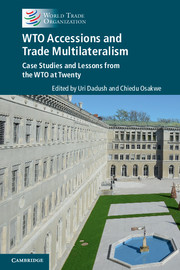Book contents
- Frontmatter
- Dedication
- Contents
- List of contributors
- Foreword
- Acknowledgements
- List of abbreviations
- Editors' note
- PART I WTO accessions, the trading system and the global economy
- PART II Overview: systemic outcomes from accessions
- PART III Members’ perspectives on accession negotiations
- PART IV Working party chairpersons’ perspectives on accession negotiations
- PART V Salient features inWTOAccession Protocols
- 29 Market access goods negotiations: salience, results and meaning
- 30 Services market opening: salience, results and meaning
- 31 WTO accession and the private sector: the nexus of rules and market opportunities
- 32 WTO accession and accession to the Agreement on Government Procurement: what is the relationship? Why should WTO acceding governments also consider GPA accession?
- 33 Energy-related rules in Accession Protocols: where are they?
- 34 Domestic framework for making and enforcing policies
- 35 Export duty commitments: the treaty dialogue and the pattern of commitments
- 36 Disciplining state trading practices: lessons from WTO accession negotiations
- 37 Intellectual property rights protection: the plus/minus debate from a least-developed country perspective – sense and nonsense
- 38 The future of multilateral investment rules in the WTO: contributions from WTO accession outcomes
- 39 Sanitary and phytosanitary measures: trends in accession plurilateral negotiations
- 40 Strengthening transparency in the multilateral trading system: the contribution of the WTO accession process
- PART VI Conclusion
- Annex: Contributor biographies
- Index
- Plate section
- References
33 - Energy-related rules in Accession Protocols: where are they?
from PART V - Salient features inWTOAccession Protocols
Published online by Cambridge University Press: 05 November 2015
- Frontmatter
- Dedication
- Contents
- List of contributors
- Foreword
- Acknowledgements
- List of abbreviations
- Editors' note
- PART I WTO accessions, the trading system and the global economy
- PART II Overview: systemic outcomes from accessions
- PART III Members’ perspectives on accession negotiations
- PART IV Working party chairpersons’ perspectives on accession negotiations
- PART V Salient features inWTOAccession Protocols
- 29 Market access goods negotiations: salience, results and meaning
- 30 Services market opening: salience, results and meaning
- 31 WTO accession and the private sector: the nexus of rules and market opportunities
- 32 WTO accession and accession to the Agreement on Government Procurement: what is the relationship? Why should WTO acceding governments also consider GPA accession?
- 33 Energy-related rules in Accession Protocols: where are they?
- 34 Domestic framework for making and enforcing policies
- 35 Export duty commitments: the treaty dialogue and the pattern of commitments
- 36 Disciplining state trading practices: lessons from WTO accession negotiations
- 37 Intellectual property rights protection: the plus/minus debate from a least-developed country perspective – sense and nonsense
- 38 The future of multilateral investment rules in the WTO: contributions from WTO accession outcomes
- 39 Sanitary and phytosanitary measures: trends in accession plurilateral negotiations
- 40 Strengthening transparency in the multilateral trading system: the contribution of the WTO accession process
- PART VI Conclusion
- Annex: Contributor biographies
- Index
- Plate section
- References
Summary
ABSTRACT
Energy issues have not been systematically discussed by WTO members in the multilateral trading system. This is owing to the fact that there is no rule on energy per se in WTO agreements. Yet all tradable energy goods and services are covered by the General Agreement on Tariffs and Trade 1994 and the General Agreement on Trade in Services respectively. With energy security and climate change high on the global agenda, there is increasing interest in how to deal with energy-related issues during WTO accession negotiations, particularly given that several energy-producing countries, energy-transit countries and energy-consuming countries are currently in accession negotiations. Following the examples of earlier accessions, the ongoing negotiation dossiers would need to negotiate energy-related specific obligations in their terms of accession. This chapter identifies five key themes relating to energy in the WTO Accession Protocols of the Article XII members and explains the rationale of how these topics relate to trade in energy based on the existing WTO rules. Further, it categorizes similar energy patterns and trends for Article XII members. Finally, the chapter draws lessons for future WTO rule-making by arguing that these ‘updated’ rules on energy, found in Article XII members' Accession Protocols, will have the potential to guide the envisaged regular work of the WTO on future rule-making on trade in energy, thereby contributing to international energy cooperation in the context of the rules-based multilateral trading system.
The importance of energy in the world economy is evident from the fact that it is a fundamental input to almost all economic activities. It also constitutes a considerable percentage of the world's aggregate gross domestic product (GDP). For instance, in the period 2009–2010, Africa, the Middle East and the Commonwealth of Independent States (CIS) all had resource shares in total exports in excess of 70 per cent, while North America, Europe and Asia all had 20 per cent or less. South and Central America were in between, at 47 per cent.
Energy will continue to play an important role in the world economy. In 2012, the International Energy Forum (IEF) projected that energy needs would rise by nearly one-third by 2035. Most of this growth and increased demand for energy is expected to come from emerging economies.
- Type
- Chapter
- Information
- WTO Accessions and Trade MultilateralismCase Studies and Lessons from the WTO at Twenty, pp. 701 - 728Publisher: Cambridge University PressPrint publication year: 2015



